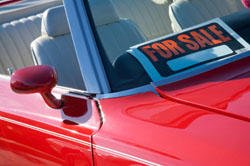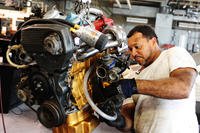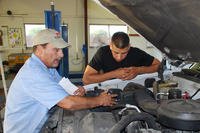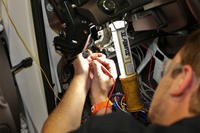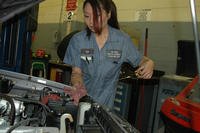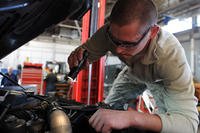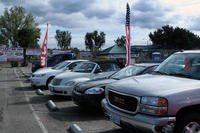Consider these factors before you take sides.
Most car buyers used to fall into one of two camps. There were the frugal types determined to save money by buying a used vehicle. Or there were new car enthusiasts willing to pay more for guaranteed reliability and that factory-fresh sparkle. Today, those lines are getting blurrier all the time.
"The new vs. used decision has gotten more complicated," says Jesse Toprak, vice president of industry trends for TrueCar.com.
"Resale values for used cars have risen in recent years, and now manufacturers are offering very attractive rebates and financing incentives on new vehicles," explains Toprak. "Combine that with the full warranty of a new car, and in some cases new will be a better deal than used."With a complete picture of the key factors to consider, you can make a more confident purchase decision. Here is a look at the benefits and drawbacks of each. Spoiler alert: There is no clear winner in the new vs. used car war.
1. Purchase Price
Used — Traditionally, price has been the biggest advantage in the used car corner. Today, the used car discount might not be as large as it used to be. Used cars are currently selling at historically high prices because there are less of them to go around, says Toprak. Several down years in new-car sales created a shortage of late-model used cars on the lot. Add to that the high demand for affordable used cars and the March earthquakes in Japan that halted production and sent even more buyers in search of used Japanese models. In short, it's a seller's market for used cars.
New — The sticker price on a new vehicle will always be higher than its used equivalent. But, in addition to rising prices of used cars, automakers are narrowing the price gap by offering hefty rebates on new vehicles. In some cases, dealers are knocking as much as $5,000 off the manufacturer's suggested retail price, which could actually make the new car cheaper than last year's used model.
2. Financing
Used — A used car may have a lower purchase price, but it could come with a higher interest rate. Used car dealers and financial institutions typically don't offer the next-to-nothing annual percentage rates that you can get with a new car loan. For example, if you finance $20,000 at 4% APR for 60 months, you'd pay nearly $2,100 in interest charges.
New — Break out your calculator. If you could get a new version of the same car with zero-percent financing (which means no interest charges), the used model would need to be at least $2,100 cheaper to make it a better deal.
3. Features
Used — Finding your perfect car in the preowned market can be a challenge. The pool of vehicles for sale is limited, especially in today's market. For example, if you're looking for a silver Ford Fusion SEL with black leather interior, you might need to broaden your search parameters or meet with disappointment.
New — Get exactly what you want. If you live in a major metro area, there could be hundreds of new Ford Fusions available from multiple dealers, so you'd be sure to find the mix of attributes you like. If not, dealers can often make arrangements to have your dream car shipped from another location, or even call the plant to build one to your exact specifications. In addition, a new vehicle gives you access to the latest and greatest technologies available in that model, such as side-curtain airbags or voice recognition features.
4. Reliability
Used — Call it the mystery factor, but it can be hard to tell whether a used car has been babied or abused. Before buying any used car, have a trusted mechanic inspect it thoroughly and pay for a CarFax report (USAA members get a 20% discount), which can reveal if the car has a troubled past. Even these steps can't predict the $500 oil leak that's ready to spring. On the brighter side, studies such as the Annual Auto Survey from the Consumer Reports National Research Center prove that the general reliability of cars has improved in the last decade, and most should keep purring long after their warranties have expired. For greater assurance, explore historical reliability ratings for specific vehicles through Consumer Reports and other auto services. Or, look into dealers' or a manufacturers' certified preowned cars, which have been rigorously inspected and carry a renewed warranty.
New — A new car can be described in three words: peace of mind. A new vehicle is fresh off the assembly line and it comes with the original manufacturer's warranty, the protection of state and federal lemon laws and free roadside assistance. In all likelihood, you'll be able to drive it maintenance-free (aside from oil changes) for at least three years.
Whether you buy a new or used car, consider purchasing an extended warranty to help protect you from expensive repairs. The extended vehicle protection by Assurant Solutions offers protection options for new and used vehicles with no deductible.
5. Depreciation
Used — The lack of depreciation is another favorite point of used car enthusiasts. A new car tends to lose the biggest chunk of value in its first two years. After that, the resale price tag stops dropping so quickly. Buying a used car is a better investment, the argument goes, because the first owner bore the brunt of the depreciation.
New — Depreciation may be less of an issue if you buy a popular car that holds its resale value. For example, cars.com reports that certain brands, such as Honda, Mercedes-Benz, Toyota and Volkswagen, tend to have lower depreciation because of their quality and reliability records.
6. Insurance
Used — In general, you'll pay less to insure a used car compared to a new one. The simple reason is that a used vehicle is worth less, and therefore costs the insurance company less to replace or repair it.
New — Though it's not the norm, there are cases where choosing a new vehicle could actually save money on auto insurance. If the new model boasts significant safety improvements over its predecessor, for example, insurers could possibly deem it less of a risk and charge lower premiums.
Before making a final decision, call your insurer for an estimate on the cost of coverage for the car you're considering. The USAA Car Buying Service allows you to browse estimated insurance costs online for the new or used cars you're considering.
